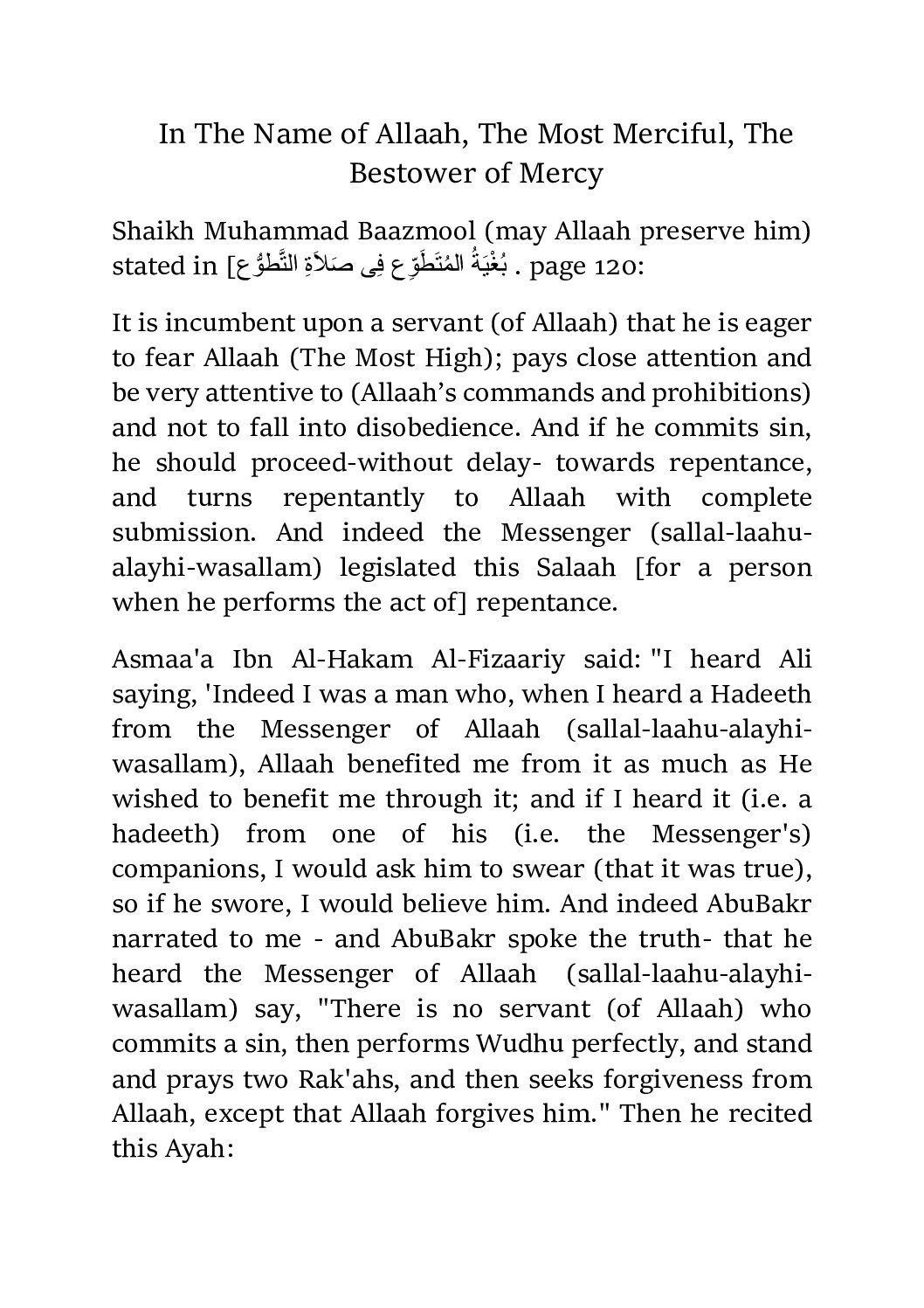Khateeb Al-Baghdaadee
Khateeb Al-Bagh’daadee (rahimahullaah) reports that ahlul ilm are in AGREEMENT that when both Jarh and Tadeel are combined in a person, then the Jarh Mufassar (detailed) is given precedence [1]
Al-Haafidh Ibnu As-Salaah
Al-Haafidh Ibnu As-Salaah (rahimahullaah) said:
When both Jarh and tadeel are combined in a person, then the Jarh is given precedence; because the who makes Tadeel gives information about that which is apparent of the person’s state of affairs, but the Jaarih (the one who criticizes) gives information about that which is hidden from the one who makes Tadeel.[2]
Al Haafidh Ibn Katheer
Al –Haafidh Ibn Katheer (rahimahullaah) said:
And what is correct is that the Jarh is given absolute precedence if it is Mufassar [3]
So know O Sunni Salafi! Indeed the ulama have come with Jarh Mufassar against Abul Hasan Al Maribee, Muhammad Al-Maghraawi, Muhammad Hasan and their likes; so this is what is given precedence according to the scholars of ahlus sunnah wal jamaa-ah. However, the hizbiyyoon still cling to general praises of some of the scholars. So they say, ‘’Shaikh Abdul Muhsin has praised Abul Hasan’’. What is the answer to this O Sunni Athari?
Shaikh Muhammad Umar Baazmool (hafidha-hullaah) Clarifies
Question: What are the rules concerning the principle of the Jarh Mufassal that takes precedence over the Ta’deel. And when the Jarh Mufassal conflicts with the Ta’deel Mufassar, does the Ta’deel Mufassar take precedence over the Jarh Mufassar?
Shaikh: The scholars have textually written that the Jarh is given precedence over the ta’deel, and they say concerning the one whose adaalah (integrity) is established, meaning that the scholars have textually written down that he has integrity and that he is trustworthy, then nothing can be accepted (in criticism of him) except the jarh mufassar. So their saying leads to the fact that the person whose adaalah is not established and the scholars have not textually stated his trustworthiness, that the jarh mujmal (i.e. not clarified) is acceptable regarding him. As for the one whose integrity is established then nothing is accepted about him except the jarh mufassar. Then they say that when the jarh mufassar conflicts with the ta’deel mufassar, such as what you have asked in the question, they say that the jarh is not rejected except when the one making the ta’deel mentions the reason why the jarh was made and then refutes it. Such as for example the one making the jarh, did so upon a man because of his aqeedah. So the one making the ta’deel said, yes, he used to be upon this belief but he abandoned it and did not return back to it. Or the one making the jarh says that he did not memorise this scroll, but he used to narrate from it from memory. So the one making the ta’deel says, yes, he used to be like that but then he returned and heard from his Shaikh again, and so his usool became grounded again concerning that scroll, and then he did not narrate except from his usool (that he revised). So when the one making the ta’deel mentions the reason why the jarh was made and also refutes it, then this (ta’deel mufassar) is accepted but with an (additional) condition that it is not known about this man who is being spoken about that he fools around, follows his desires and deception. Because some people may give ta’deel mufassal to someone whom the scholars have made jarh mufassal of, and the one who has had jarh made upon him by the Scholars with tafseel, it has become established concerning him that he is from those who play games and follow the desires, from the people of deception, those who do not submit to the truth and do not return to the truth. So then, that speech of the one who made ta’deel, even if it was mufassal concerning him, then we do not accept it due to what we have come to know about the condition of this man. Allaah knows best.
Question: There are those who reject the statements of the Salafee Mashaayikh that refute Abul-Hasan with the claim that the Mashaayikh give him tazkiyah, and amongst them is Shaikh Abdul-Muhsin al-Abbaad and the Mashaayikh of Jordan and Shaikh Ibraaheem ar-Ruhailee. So what is your saying O Shaikh?
The Shaikh replied: I say that Shaikh Abdul-Muhsin al-Abbaad is from the Major Scholars and he is of a high tabaqah (rank, level) with us here in the Kingdom. As for the remainder (of those that were mentioned) then they are students of knowledge. They are not from the Scholars. They are from the students. And what is clear to me is that Shaikh Abdul-Muhsin has not come across all of the speech that the Scholars have mentioned concerning the jarh (of Abul-Hasan). And the principle is that the one making the jarh (the jaarih) is given precedence over the one making the ta’deel (the mu’addil). Meaning, I will inform you by applying this principle and see. What is correct? If a narrator from the narrators of hadeeth was declared trustworthy by Imaam Ahmad bin Hanbal and a person who was less than Imaam Ahmad bin Hanbal made jarh of him with a jarh mufassar, would you accept the saying of this jaarih or would you reject it? What would be upon you? Questioner: I will not accept O Shaikh. Shaikh: You would not accept it? Questioner: Yes (I would not accept it). Shaikh: No (this is wrong), what is correct is that you accept the words of one who makes Jarh… because the one who makes the jarh has additional knowledge with him, he has additional knowledge. Hence, we say, in the application of this principle the jarh is given precedence over the ta’deel. For a man can come and some from the scholars declare him trustworthy, then another scholars comes from amongst the scholars of hadeeth, who is less than those major scholars and he makes jarh of him with a jarh mufassar. We say that we accept this jarh and those scholars, alongside their greatness, the condition of this narrator did not become clear to them what had become clear to this one who made the jarh. Likewise, we say in the issue of Abul-Hasan, those who made jarh of Abul-Hasan, they made jarh of him with a jarh mufassar, in their jarh, they depended upon expressions of his that are written in his books and those in his cassettes that are heard in his lessons and his lectures, and they relied upon his numerous positions (on certain issues).
My brother, all the sons of Adam make mistakes, and the best of those who make mistakes are those who repent. There is no one who is free from error. However, the people of deviation and desires, when they err and are advised they do not return and they persist upon their falsehood, and show stubbon resistance and follow their desires over their intellects, Shaitaan beautifies (matters) for them, and their souls that command the evil beautify (matters) for them, that if they were to return their position in the souls of the people would diminish, and the people will no longer place trust in their knowledge anymore, and their followers will not return to them. Shaitaan beautifies to them that their recantation, and their submission to the truth and their clarity in this recantation, and their adherence to the Sunnah that has become clear, he beautifies to them that this will weaken their standing and it will reduce their worth. Then the desires run through them and the Shaitaan runs through them, and plays with them in these matters. No one returns safe from innovations and desire except those upon whom your Lord bestows mercy.
Questioner: What is the correct position against the one who defends Abul-Hasan and who supports him?
Shaikh: The correct position against the one who defends Abul Hasan is the (same) position towards the one who defends the Ahl ul-Bida’. We say: He is to be advised, this one who defends Ahl ul Bida’, and who supports them. So either he returns, or otherwise he is given the treatment (that is given to Ahl ul-Bida’) of warning against him and keeping away from him and from sitting with him and from listening to him. And Allaah knows best.
So understand this well O Sunni Athari! We hold onto the correct manhaj positions by the tawfeeq of Allaah, and we ask Him (subhaanah) by His Greatest Name to guide us, and also guide those who seek to demolish these principles.
References:
[1] Siyaanatu As-Salafi Min Waswasati Wa Talbeesaat Ali Al-Halabi; [page: 132]
[2] Siyaanatu As-salafi Min Waswasati Wa Talbeesaat Ali Al-Halabi; [page:132]
[3] Siyaanatu As-salafi Min Waswasati Wa Talbeesaat Ali Al Halabi; [page:134-135]
[4]Posted on Salafitalk (may Allaah reward its maintainers) by brother Naasir-ud-deen (hafidha-hullaah)
[See-link:] http://www.salafitalk.net/st/viewmessages.cfm?Forum=23&Topic=1113]





